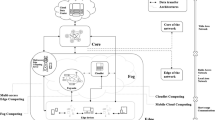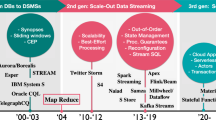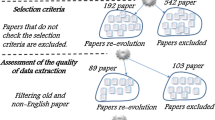Abstract
As the huge number of mobile devices (e.g., smart phones, tablets and netbooks) increases, more and more people choose to use the Internet services financed by mobile Internet service providers (MISPs). To provide better services, it is quite necessary for MISPs to analyze the information hidden in the big data stream generated by users. Therefore, processing the real-time big data stream efficiently has become increasingly important. However, traditional static data storage technology fails to meet the demands of real-time data processing. To improve processing capacity, many parallel processing structures are proposed, which brings up the problem about how the parallel devices can be scheduled to maximize their efficiency. Accordingly, a dynamic assignment scheduling algorithm for big data stream processing in mobile Internet services is proposed, and a stream query graph is built to calculate the weight of every edge. The edge with the minimum weight is selected to send tuples. Simulation results show that the proper number of the logic devices can dramatically reduce system response time. Furthermore, system context switching is reduced by increasing the number of tuples sent each time.

















Similar content being viewed by others
References
Almenares F, Arias P, Marin A et al (2013) Overhead of using secure wireless communications in mobile computing. IEEE Trans Consum Electron 59(2):335–342
Shin S, Ko J, Shin DH et al (2013) Semantic search for smart mobile devices. In: Proceedings of ACM international conference on intelligent user interfaces companion, pp 95–96
Kwon HJ, Hong KS (2012) Personalized real-time location-tagged contents recommender system based on mobile social networks. In: Proceedings of IEEE international conference on consumer electronics (ICCE), pp 558–559
Jang SB, Kim YG, Na HS et al (2009) Embedded system architecture for an WLAN-based dual mode mobile phone. IEEE Trans Consum Electron 55(3):1623–1630
Wang K, Lu H, Shu L et al (2014) A context-aware system architecture for leak point detection in the large-scale petrochemical industry. IEEE Commun Mag 52(6):62–69
Wang K, Shao Y, Shu L et al (2015) LDPA: a local data processing architecture in ambient assisted living communications. IEEE Commun Mag 53(1):56–63
Fong ACM, Zhou B, Hui SC et al (2011) Web content recommender system based on consumer behavior modeling. IEEE Trans Consum Electron 57(2):962–969
Zhang W, Xu L, Duan P et al (2015) A video cloud platform combing online and offline cloud computing technologies. Pers Ubiquit Comput 19(7):1099–1110
Zhou ZB, Zhao D, Shu L et al (2015) A novel two-tier cooperative caching mechanism for the optimization of multi-attribute periodic queries in wireless sensor networks. Sensors 15(7):15033–15066
De Andrade TPC, da Fonseca NLS, Oliveira LB et al (2012) MAC protocols for wireless sensor networks over radio-over-fiber links. In: Proceedings of IEEE international conference on communications (ICC), pp 254–259
He L, Liu G (2012) Optimal cross layer design for video transmission over OFDMA system. In: Proceedings of IEEE international conference on communications (ICC), pp 1154–1159
Zhou Y, Aberer K, Tan KL (2008) Toward massive query optimization in large-scale distributed stream systems. In: Proceedings of the 9th ACM/IFIP/USENIX international conference on middleware. Springer, New York, Inc., pp 326–345
Gopalan A, Caramanis C, Shakkottai S (2012) Low-delay wireless scheduling with partial channel-state information. In: Proceedings of IEEE international conference on computer communications (INFOCOM), pp 1071–1079
Wang G, Gong W, DeRenzi B et al (2007) Ant colony optimizations for resource-and timing-constrained operation scheduling. IEEE Trans Comput Aided Des Integr Circuits Syst 26(6):1010–1029
Mishra A, Venkitasubramaniam P (2012) Source anonymity in fair scheduling: A case for the proportional method. In: Proceedings of 2012 IEEE international conference on communications (ICC), pp 1118–1122
Wang T, Shen Y, Mazuelas S et al (2012) Distributed scheduling for cooperative localization based on information evolution. In: Proceedings of IEEE international conference on communications (ICC), pp 576–580
Wang K, Shao Y, Shu L et al (2016) Mobile big data fault-tolerant processing for eHealth networks. IEEE Network 30(1):36–42
Li Y, Ghamri-Doudane Y (2011) Channel-hole based cooperative scheduling in multiple relay systems. In: Proceedings of IEEE international conference on communications (ICC), pp 1–6
Ashraf A, Jokhio F, Deneke T et al (2013) Stream-based admission control and scheduling for video transcoding in cloud computing. In: Proceedings of the 13th IEEE/ACM international symposium on cluster, cloud and grid computing (CCGrid), pp 482–489
Kang Y, Lin Y (2011) A recursive algorithm for scheduling of tasks in a heterogeneous distributed environment. In: Proceedings of 2011 4th international conference on biomedical engineering and informatics (BMEI), vol 4, pp 2099–2103
Golab L, Johnson T, Shkapenyuk V (2012) Scalable scheduling of updates in streaming data warehouses. IEEE Trans Knowl Data Eng 24(6):1092–1105
Zhou ZB, Tang J, Zhang LJ et al (2014) EGF-tree: an energy-efficient index tree for facilitating multi-region query aggregation in the internet of things. Pers Ubiquit Comput 18(4):951–966
Zhou ZB, Xing R, Gaaloul W et al (2015) A three-dimensional sub-region query processing mechanism in underwater WSNs. Pers Ubiquit Comput 19(7):1075–1086
Wen Y, Zhang G, Zhu X (2011) Lightweight packet scheduling algorithms for content uploading from mobile devices to media cloud. In: Proceedings of IEEE GLOBECOM workshops (GC Wkshps), pp 45–50
Heinze T, Pappalardo V, Jerzak Z et al (2014) Auto-scaling techniques for elastic data stream processing. In: Proceedings of the 30th IEEE international conference on data engineering workshops (ICDEW), pp 296–302
Gopalan A, Caramanis C, Shakkottai S (2012) Low-delay wireless scheduling with partial channel-state information. In: Proceedings of IEEE international conference on computer communications (INFOCOM), pp 1071–1079
Zhang L, Li Z, Wu C (2014) Dynamic resource provisioning in cloud computing: a randomized auction approach. In: Proceedings of IEEE international conference on computer communications (INFOCOM), pp 433–441
Qiaoyu L, Jianwei L, Yubin X (2010) Performance analysis of data organization of the real-time memory database based on red-black tree. In: Proceedings of international conference on computing, control and industrial engineering (CCIE), pp 428–430
Steinmaurer T, Traxler P, Zwick M et al (2014) Combining stream processing engines and big data storages for data analysis. Foundations of Intelligent Systems. Springer International Publishing, pp 476–485
Wang G, Gong W, DeRenzi B et al (2007) Ant colony optimizations for resource-and timing-constrained operation scheduling. IEEE Trans Comput Aided Des Integr Circuits Syst 26(6):1010–1029
Mingsheng S, Shixin S, Qingxian W (2003) An efficient parallel scheduling algorithm of dependent task graphs. In: Proceedings of the 4th IEEE international conference on parallel and distributed computing, applications and technologies (PDCAT), pp 595–598
Shang P, Wu J, Zhu X (2011) Oblique projection based linear precoding for downlink multi-user multiple-input multiple-output communications. In: Proceedings of IEEE GLOBECOM workshops (GC Wkshps), pp 560–564
Huang W, Ding L (2011) Project-scheduling problem with random time-dependent activity duration times. IEEE Trans Eng Manage 58(2):377–387
Chen Q, Zhang D, Guo M et al (2010) Samr: A self-adaptive mapreduce scheduling algorithm in heterogeneous environment. In: Proceedings of the 10th IEEE international conference on computer and information technology (CIT), pp 2736–2743
Zhou Z, Sellami M, Gaaloul W et al (2013) Data providing services clustering and management for facilitating service discovery and replacement. IEEE Trans Autom Sci Eng 10(4):1131–1146
Yang L, Cao J, Yuan Y et al (2013) A framework for partitioning and execution of data stream applications in mobile cloud computing. ACM Sigmetrics Perform Eval Rev 40(4):23–32
Thomas H, Charles E (2009) Introduction to algorithm. MIT Press, ISBN: 9780262533058
Ikeda Y, Shimada S, Miura T (2012) Well formed PetriNet for reachablility. In: Proceedings of the 8th international conference on signal image technology and internet based systems (SITIS), pp 595–602
Kalita M, Bezboruah T (2011) Investigation on performance testing and evaluation of PReWebD: a. NET technique for implementing web application. IET Softw 5(4):357–365
Anicic D, Fodor P, Stühmer R et al (2009) Event-driven approach for logic-based complex event processing. Proc IEEE Int Conf Comput Sci Eng 1:56–63
Wang K, Yu Y (2013) A query-matching mechanism over out-of-order event stream in IOT. Int J Ad Hoc Ubiquitous Comput 13(3/4):197–208
Wang K, Zhuo L, Shao Y et al (2016) Towards distributed data processing on intelligent leakpoints prediction in petrochemical industries. IEEE Trans Ind Inf. doi:10.1109/TII.2016.2537788
Acknowledgments
This work is supported by NSFC (61572262, 61100213, 61571233, 61373135 and 61572172); SFDPH (20113223120007); NSF of Jiangsu Province (BK20141427), NUPT (NY214097); and Open research fund of Key Lab of Broadband Wireless Communication and Sensor Network Technology (Nanjing University of Posts and Telecommunications), Ministry of Education (NYKL201507).
Author information
Authors and Affiliations
Corresponding author
Rights and permissions
About this article
Cite this article
Liu, Y., Wang, K., Yu, Y. et al. A dynamic assignment scheduling algorithm for big data stream processing in mobile Internet services. Pers Ubiquit Comput 20, 373–383 (2016). https://doi.org/10.1007/s00779-016-0914-z
Received:
Accepted:
Published:
Issue Date:
DOI: https://doi.org/10.1007/s00779-016-0914-z




